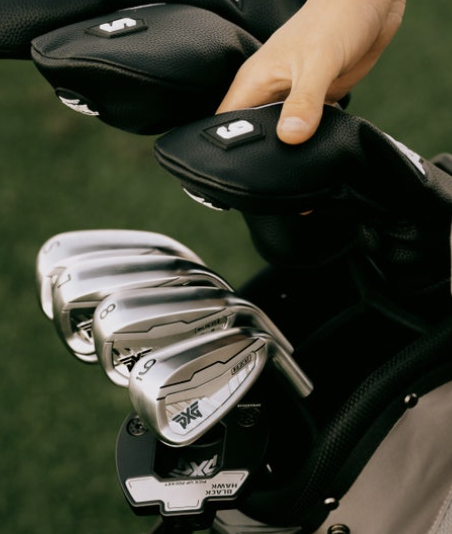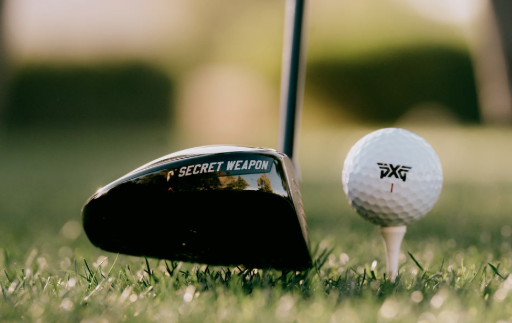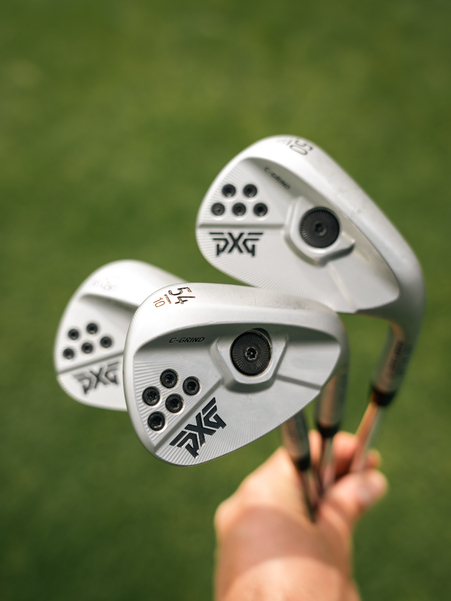
Whether you’ve just started the game of golf, or you’ve been playing for some time and are ready to take your game to the next level, understanding how wedges are supposed to be played is a vital part of your golf game that can elevate your skills and lower your score. When it comes to golf wedges, it can be overwhelming to see all the different options available. Different lofts, grinds, and bounce angles can make it difficult to know which wedge to choose for a given shot. However, understanding the purpose of each loft can help make the decision a bit easier. Let’s look at why wedges come in different lofts and how to choose the right one for your game.
What is a Wedge?
First, let’s talk about what a wedge actually is. A wedge has the shortest shaft, the highest loft, and is a high-lofted club most frequently used around the green and fairway. Wedges specialize in hitting the ball high and spinning the ball once it lands. Like we said, different lofts, grinds, and bounce angles can change how each shot is performed, making it challenging to know which wedge is right for your perfect shot.
So Many Options
Let’s discuss options. There are a variety of loft options when it comes to wedges. Why? These clubs are designed to help golfers navigate different types of shots around the green, such as approach shots, pitches, chips, and bunker shots. Each of these shots requires a different trajectory and distance, which is why wedges are available in a range of lofts. The higher lofted wedges (60, 58, 56 degrees), for example, will produce a higher ball flight and shorter distance, while lower lofted wedges (54, 52, 50, 48 degrees) will produce a lower ball flight and longer distance.
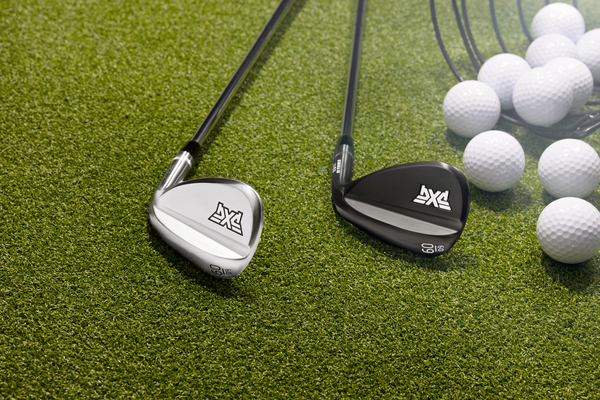
Golf wedges are typically divided into four categories: pitching wedges, gap wedges, sand wedges, and lob wedges. Each of these wedges has a different loft, bounce angle, and grind, which affects the performance and playability of the club. Pitching wedges typically have a loft of around 46 to 48 degrees, while gap wedges have a loft of around 50 to 52 degrees. Sand wedges have a loft of around 54 and 56 degrees, and lob wedges have the highest loft of around 58 to 64 degrees. All four different types of wedges play a unique part in a player’s golf game, let’s take a closer look into each wedge and learn more about how each club performs.
Pitching Wedge
The pitching wedge is typically the lowest lofted club in a golfer’s wedge set. A pitching wedge can be used for both mid-range shots from the fairway/rough and bump-and-run chipping around the green. While a pitching wedge has a higher degree of loft than its partnering irons and is used for high-trajectory shots toward your target, this particular wedge is also a great option for playing low, rolling shots around the green since it also carries less loft than a sand or lob wedge. This is because the low loft lets the ball fly lower and roll further once it lands on the green. The pitching wedge is an all-purpose club, but golfers tend to use it less frequently as they get better at their short game and need more control with chips and pitches. When first starting, most golfers will rely on the pitching wedge as their only wedge, but as you learn more about the other wedges available you will see why using a different wedge based on the shot at hand can take your game from novice to advanced. Being able to play different types of shots with your pitching wedge is a great way to develop a sound short game. The more ways you can spin, chip, and pitch a golf ball around the green will help you play better golf in all types of scenarios.
Gap Wedge
Next up is the gap wedge. One of the more versatile wedges in our lineup, due to the fact that the gap wedge fills the gap between the pitching wedge and the sand wedge, hence the name. Gap wedges typically have a loft between 50-52 degrees, which is perfect for those approach shots that are too long for the pitching wedge but too short for the sand wedge. Like most golfers, one will find themselves at a yardage point where neither a pitching nor sand wedge is called for. Although more advanced players have the ability to play different types of shots with either club, including a gap wedge is a great option when those in-between yardages come into play without having to alter your swing.
Sand Wedge
The sand wedge is a specialized club that is used for shots around the green. However, as the name suggests, it is more commonly known for assisting with shots from bunkers. Sand wedges typically have a loft between 54-56 degrees, which is perfect for getting the ball out of a bunker and onto the green quickly. However, because of the club’s heavier weight and large bounce, it is useful for a variety of shots, not strictly those involving sand. The sand wedge is a versatile club that can be played for both high and lower-trajectory shots. By either opening or closing the face when setting up to the ball, a sand wedge can now become three different lofts for any lie you are in.
Lob Wedge
Finally, the lob wedge is usually the highest lofted club in a golfer’s bag and is used mainly for those high, soft shots around the green. Depending on your skill level, using a lob wedge may be beneficial or disruptive to your short game. While skilled players have the ability to control the spin of a lob wedge and land it closer to the hole with little-to-no rollout, intermediate golfers haven’t developed that skill quite yet. Lob wedges typically have a loft between 58-64 degrees, which is perfect for those shots where you need to get the ball to stop quickly, such as a shot over a bunker or a chip shot over a slope. Beyond the green, the lob wedge is a real lifesaver when it comes to obstacles such as lips in sand traps or even trees in line with your shot. It has been known to save more than a few golfers from some tricky lies along the course, so while it may not be the most versatile club in your bag, it is certainly a useful one to have around when the time is right.
Hopefully, you gained a slightly better understanding of the wedge hierarchy and how they all work so you are better prepared for your next round. As you probably gathered, there is a lot to learn when it comes to wedges and choosing the right one isn’t a simple right or wrong answer. It varies from golfer to golfer and even course to course, however better understanding of how each wedge works is the start of figuring out which is best for your game.
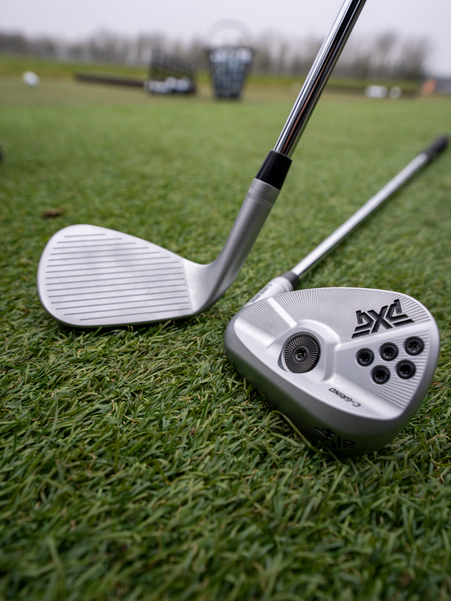
Ready to take these tips to the course? Check out our Sugar Daddy II Wedge with the BP-Grind and C-Grind options available in every loft. The BP-Grind provides additional bounce and maximum forgiveness for those lush turf conditions or deep sand traps. For more skilled golfers, we recommend the C-Grind as it delivers a moderate bounce for those more creative shots around the green. If you prefer to get a professional opinion on your wedge game, set up a 1-on-1 appointment with a PXG expert fitter. They will take you through a detailed and personal fitting experience to help you figure out the best wedge type for you game. Head to our shop and choose the Sugar Daddy II Wedge and loft to elevate your short game and lower your score on your next round.


